Wednesday Feb 18, 2026
Wednesday Feb 18, 2026
Thursday, 30 June 2022 00:30 - - {{hitsCtrl.values.hits}}
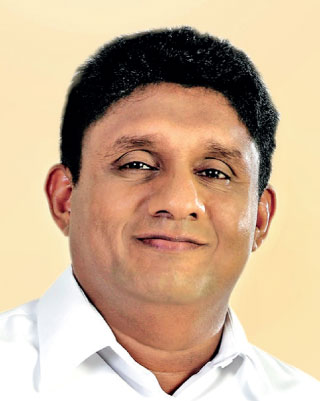
Sajith Premadasa
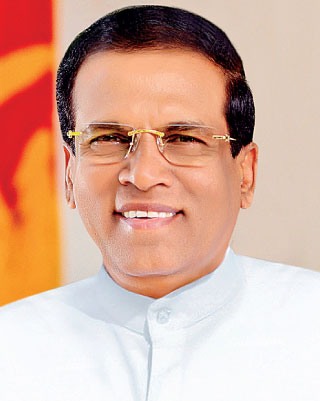
Maithripala Sirisena
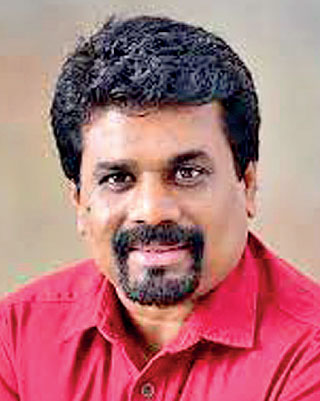
Anura Kumara Dissanayake
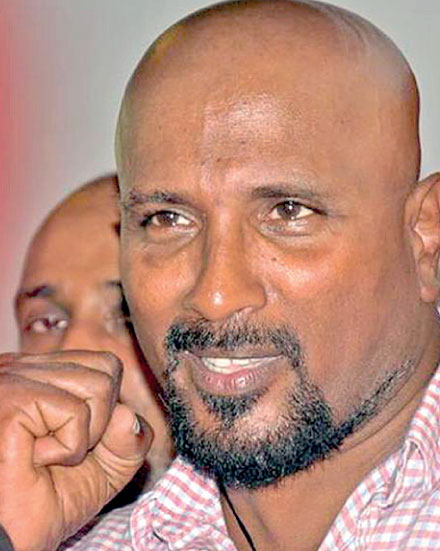
Kumara Gunaratnam
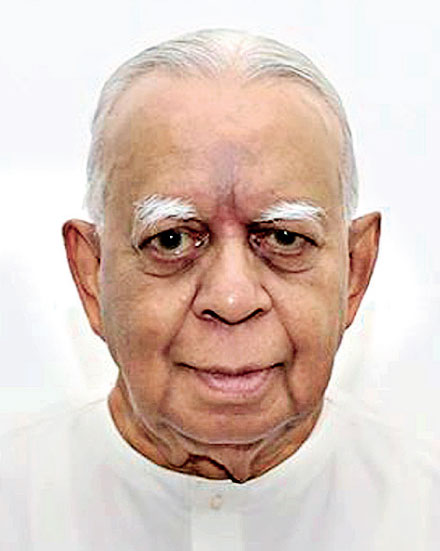
R. Sampanthan
|
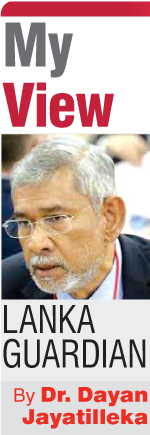 It is bitterly ironic that having been swept into office on a wave of Islamophobia long before Zahran’s jihadi terrorist organisation was born, and having callously enforced the cremation of Muslim corpses during COVID-19 long after the WHO had deemed it unnecessary, the Gotabaya regime has to plead with Qatar for oil. How would the Organization of the Islamic Conference (OIC) have responded to this emergency, had Sirimavo Bandaranaike, Ranasinghe Premadasa, Mahinda Rajapaksa or Maithripala Sirisena—indeed anyone but Gotabaya—been in office? Once again we are paying the price for Gota’s sins.
It is bitterly ironic that having been swept into office on a wave of Islamophobia long before Zahran’s jihadi terrorist organisation was born, and having callously enforced the cremation of Muslim corpses during COVID-19 long after the WHO had deemed it unnecessary, the Gotabaya regime has to plead with Qatar for oil. How would the Organization of the Islamic Conference (OIC) have responded to this emergency, had Sirimavo Bandaranaike, Ranasinghe Premadasa, Mahinda Rajapaksa or Maithripala Sirisena—indeed anyone but Gotabaya—been in office? Once again we are paying the price for Gota’s sins.
Gota’s real prop
The Gotabaya regime gets away with treating the citizens as outrageously as it does, because of the split in the Opposition, which if it converged or cooperated, could muster 100 MPs, and if it draws in SLPP dissidents, can make the magic 113 mark for taking over the Government or parliamentary self-dissolution and a snap election.
If Churchill, Stalin, Roosevelt and De Gaulle could unite to rid the world of Adolf Hitler, why can’t Sajith Premadasa, Maithripala Sirisena, Anura Kumara Dissanayake, Kumara Gunaratnam and R. Sampanthan not unite to rid the country of Gotabaya Rajapaksa rule, in the face of the agony and anguish of the Sri Lankan citizenry?
If anyone sincerely wants Gota to go, they should also want the Opposition to converge, and should campaign for such convergence.
Anyone in the Opposition who rejects or impedes broad Opposition unity, actually props up Gotabaya rule and prolongs the suffering of the people. So does anyone in civil society and the broad resistance who fails to campaign for or support the project of a united Opposition platform.
|
International factor
The international community should insist on fast-track implementation of the promised 21st Amendment dismantling the autocratic 20th Amendment, and snap elections, in negotiations with the Gotabaya regime. It should also insist to the Opposition that it unites.
Risking World War III or a Europe-wide war by escalation against Russia in a bid to win the global democracy vs. autocracy fight instead of opting for Kissinger’s formula at Davos, is dangerously imprudent, but failing to go all-in and tip over a wildly unpopular, irrational and dysfunctional autocrat in Sri Lanka, the small yet strategic island in the Indo-Pacific, is passing up a low-risk chance to win one for democracy against autocracy.
Rajapaksa rearguard
Former PM and ex-President Mahinda Rajapaksa doesn’t seem to have learned the right lessons from his tragic fall from war-winning President to a perilous episode of internal exile at the Navy camp in Trincomalee. A Sunday newspaper hardly unfriendly to him
reports that:
“Former Prime Minister Mahinda Rajapaksa claimed that the country must opt for a General Election only after the present Government is able to resolve the ongoing crises… his view is that it would not be apt to hold polls at this juncture.”
No Government headed by his brother who created much of the crisis, will be able to “resolve the ongoing crises”. Gotabaya Rajapaksa is openly reviled by the Sri Lankan masses while he is regarded with cold hostility and distrust by the international community. That prevents Sri Lanka from receiving the maximum economic support from external sources that it otherwise could.
The Rajapaksas must understand that they cannot count upon the unswerving support of the armed forces, a high percentage of which come from the rural peasantry and families of the working people in general.
With the manic myopia that is his hallmark, President Gotabaya appears to have watered down the 21st Amendment still further, with ‘transitional’ caveats and kite-flying about adding the Romesh de Silva Constitutional proposals into 21A. The Romesh de Silva process was the edifice built upon the autocratic 20A, not a dismantling of it.
The intention of Gota and his hardline MPs is myopic because the more robust a cut of presidential powers that 21A contains, the greater the credibility of reforms we can present the world community so as to secure assistance and the less the need for a nationwide uprising, a mega-Hartal/mega-Aragalaya (or Aragalaya Mega as they’d say), to throw him out.
For instance, Foreign Minister G.L. Peiris’ entire pitch to the UN Human Rights Council a few weeks back, hinged on the upcoming 21st Amendment. President Gotabaya’s debasement of it ensures that he and the military will loom larger as targets in Geneva this September, during which we can expect a major push in the form of a rigorous Resolution which in turn will impact legislatures worldwide and reduce the possibilities of external assistance.
Ranil Wickremesinghe is failing to deliver as PM because the shadow of Gotabaya Rajapaksa looms behind him. Ironically this is also why Sajith Premadasa clocked a very decent 42% but couldn’t make it to 45%-48% during the November 2018 Presidential election—the figure of Ranil Wickremesinghe as UNP leader and a future PM loomed large behind him, though Sajith tried to live it down.
Had Gotabaya stuck to his promise to the nation that he would restore the 19th Amendment, the equation with the incoming PM— who, in the event, was Ranil—would have been more balanced, thereby strengthening that PM in negotiations with the international community and institutions. By partly reneging on his pledge to the nation, Gotabaya has weakened the PM and diminished his capacity for drumming up adequate economic support for the country and its people. It also leaves the mega-Aragalaya/mega-Hartal option—which is hardly unproblematic, given its economically deadly effects—as the default option.
|
Ranil’s karma
The centrist SLFP is quite correct to seek to challenge in the Supreme Court (as Party Secretary Dayasiri Jayasekara announced), the distortions in the draft Constitutional amendment. However, the main Opposition seems more likely to vote against 21A or boycott the vote thereby sabotaging a two-thirds majority. This is not a unique or even original blunder of the present Opposition.
In yet another bitter irony or example of the variety of karma that plays out in one’s present life, it was Ranil Wickremesinghe as Opposition Leader who wrote the playbook which the current Opposition seems to be following.
The present problem of the Gotabaya presidency would simply not have arisen had President Chandrika Bandaranaike Kumaratunga’s August 2000 Constitutional bill gone through Parliament. CBK had wasted precious time and political capital on an uber-liberal, centrifugal ‘union of regions package’ (or simply ‘the Package’ as it was called) in 1995 and 1997, instead of getting on with the business of implementing the 13th Amendment while fighting the Tigers.
She got it right five years later in her August 2000 draft which had deleted the ‘union of regions’ definition, with her team headed by Prof. G.L. Peiris and the UNP team headed by Karu Jayasuriya, MP, hammering out a far more moderate, workable draft. (I had publicly opposed the 1995 and 1997 ‘packages’ but supported the August 2000 draft.)
Two things went very wrong. Firstly, CBK, like Gota decades later, tried a last-minute subterfuge of ‘transitional provisions’ which meant that some reforms kicked-in only after her term of office.
Secondly, Opposition Leader Ranil Wickremesinghe overreacted or took the opportunity to throw a tantrum and exit as he had planned to or his partner and ally at the time Anton Balasingham had signalled to him (which is what Lasantha Wickrematunga told an irate Sirisena Cooray in my presence and that of a well-known, militantly anti-MR, anti-executive presidency columnist of today).
What Prime Minister Ranil Wickremesinghe should have done in August 2000 was to move a slew of amendments to shift the needle. Instead, the UNP, under his leadership and with his visible encouragement, burned the draft bill in the House. Now, he looks set to be given a dose of his own medicine. Now the chickens are coming home to roost, with Opposition Leader Sajith Premadasa about to play Opposition leader Ranil Wickremesinghe and studiedly go nuclear, while President Gotabaya Rajapaksa plays President Chandrika Bandaranaike Kumaratunga with his sleight-of-hand of transitional provisions which exempt him.
Sectarian strategy
What the Opposition led by Sajith Premadasa should do in 2022 is what its parent party the UNP should have done under Ranil Wickremesinghe in 2000 as admonitorily outlined by Sirisena Cooray, a tough-minded ‘old school’ Realist strategist, to Lasantha Wickrematunga:
(a) Move rectifying amendments but settle for the consensus; vote the draft through.
(b) Use the broad bi-partisan consensus as the stepping stone to a National Government.
(c) Shift the balance-of-power in Parliament, and takeover.
(d) Level the administrative playing field and win the first available election.
The reason the SJB-TNA-JVP Opposition isn’t about to do this, and will probably take the Ranil 2000 ‘wrecking-ball’ option, is the enormous warp in the strategy they seem to share, wittingly or unwittingly.
1. While the people’s primary enemy is Gotabaya, the Opposition’s enemy is the Pohottuwa, the SLFP and the 10 parties as well, because they are electoral rivals whose decimation will guarantee displacement of votes.
2. While strategic sagacity calls for a split in the Pohottuwa, isolating the pro-Gota neoconservatives hawks, creating a wedge between them and the doves or reformist-dissidents and drawing them and the SLFP into a broad Opposition bloc, the Opposition—SJB and JVP—prefers to lump them all together and push them over the cliff for narrow electoral gain.
3. While the unprecedented crisis rationally dictates political and policy consensus, chiefly within the entire oppositional space, the established opposition mirrors the President and pro-Rajapaksa Pohottuwa hardliners in a preferential option for the politics of polarisation and unilateralism.
This is a moment when the 21A issue provides a perfect opening for application of President Premadasa’s famous ‘3 Cs’ formula: ‘Consultation-Compromise-Consensus’.
Even post-election victory, no party on its own can solve the crisis or manage the effects of a stabilisation and recovery package. The SJB or JVP could conceivably win an election on its own, but it cannot govern stably on its own. Each would need a broad cross-party coalition.
The SJB can win an election but needs a broad coalition for domestic stability and sustainability. The JVP could win an election but needs a broad coalition for international legitimacy and viability.
Furthermore, in a tightly-fought election, it may be the existence of coalition partners that enable the SJB or JVP to win over the middle-ground and thereby clinch the race.
|
Illogical economics
While I’m glad the IMF is in town what I am not so glad about is the economic logic of our political and policy-making class.
Prime Minister Wickremesinghe and the economic policy troika of the main Opposition seem to share a formula: the IMF program would cause an uptick in the international ratings which in turn would unlock access to the international money markets, which would enable us to borrow.
This seems to me exactly the same formula that caused this collapse in the first place. We are under the rubble because we borrowed far too much from the international (private) money markets (47% of our debt) as distinct from states (10% each from Japan and China) and multilateral institutions. This was a bipartisan policy extending from the Mahinda Rajapaksa second term, through Yahapalanaya, during which period we seem to have borrowed even more than MR did, with less to show for it.
So, the Ranil-SJB solution seems to be indistinguishable from the problem: we must revive and restore our access to the private international capital markets, so that we can borrow more, i.e., incur more debt—ostensibly for better purpose—so that we can get out of our economic crisis which is to a considerable degree, a debt trap.
It sounds to me like a karmic cycle or less grandly, a hamster on a wheel. Yanis Varoufakis (and Prof. James Galbraith) already named this policy model sardonically as citizenship of ‘Bailoutistan’. You borrow more to repay debts and you keep repaying the old and the new debts which keep increasing and you have to commit even more, to more drastic austerity packages for the majority of the citizenry.
What is the difference between this and the Rajapaksa policy, except for the family-centric corruption?
Across the party-political spectrum there isn’t a single economist with a book-length international publication.
Dwarfed by crisis
For the first time since 1948 we are dwarfed by a crisis. Our current crisis resides partly in the fact that at no time in our post-Independence history has there been such an asymmetry between the scale of the crisis and the scope of our leaders across the spectrum.
There is a tripartite division in the political class during this crisis: those who have abysmally failed and yet cruelly refuse to leave; those who could make a difference but blink in the face of the complex, challenging burden and don’t step up to the plate; and those who criticise everyone else since Independence while suggesting no solutions.
Though I have remained for over a half-century at the exact antipode of the Ayn Rand theory of creative entrepreneurs as heroic vanguard, in this crisis, the most compelling, credible, confidently articulated and determinedly hopeful ideas of Sri Lankan recovery I have recently heard, come from two self-made entrepreneurs: Dhammika Perera (Derana 360) and Dudley Sirisena (Hiru, Rupavahini).
|
JVP, FSP, Aragalaya
How can the JVP-NPP or the FSP-IUSF be the alternative when there is no alternative program—even a transitional or minimum program—to be seen or heard?
The Left is proud of itself as the authentic alternative, and in the case of the JVP-NPP as containing a large number of academics. Yet, apart from a clunky attempt at a policy document several months ago well before the ubiquitous queues, which made no impact and was quickly forgotten, they have produced nothing; no alternative policy intervention in the crisis.
The Aragalaya, JVP-NPP and FSP-IUSF’s critique of the sweeping arrests by the State authorities studiously leaves untouched the question of what would be the appropriate action to take concerning the killing of nine people in the second half of 9 May, including the Member of Parliament. Should there be no investigations, arrests and legal proceedings for those acts of homicide or manslaughter?
Is the assumption that everyone who participated in those heinous action was an Aragalaya activist (“aragalakaruwek”) or should automatically be adopted as one, and that being an activist of the Aragalaya (“aragalakaruwa”) in actuality or by self-proclamation or adoption by acclaim, provides for impunity and immunity even if the act is one of killing? Is that the superior new normal that the system change will usher in?
If so how does this assumption differ from those who hold that Sgt Sunil Ratnayake should go free though he murdered civilians including children, because he fought in an elite unit—the Airmobile brigade– to defend the country?
Is it not also the argument that the LTTE should not be condemned for blowing up commuters or skewering infants because they were doing it for the cause of Tamil liberation against the oppressive Sinhala state?